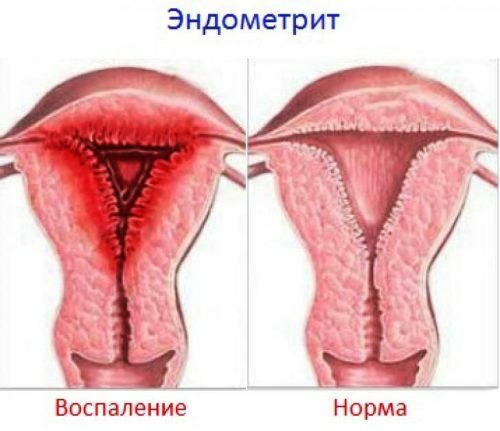To actively participate in the process of fertilization and further bearing of the fetus, the woman's womb has a special layer of cells that lining her inner wall. In the normal state, the female genital organ is completely shielded from the external infection, but there are situations when there is inflammation of the endometrium. In practical gynecology, this condition is called endometritis.
The inflammatory process of the inner wall of the uterus is often connected and the defeat of the muscular wall itself, then put endomyometritis. The treatment is aimed at the complete destruction of bacteria and microbes in all layers of tissues.
causes of endometritis
Modern medicine divides the disease attwo main subspecies: acute and chronic endometritis. The reasons for the occurrence of such problems in women have quite a different background.
Acute endometritis usually results from infection in the uterine cavity under various instrumental manipulations. Here it is possible to carry:
- Manufacture of abortion on various terms of pregnancy. It should be noted that vacuum extraction or medical abortion causes this condition 10 to 15 times less frequently than the usual instrumental procedure for scraping the uterine cavity.
- The wide introduction of endoscopic techniques in gynecology into modern practice, too, strangely enough, increases the number of inflammatory processes in the uterus. Hysteroscopy, although this manipulation is performed under sterile operating conditions, is the cause of the development of 15% endometritis.
- Extremely high probability of inflammation of the endometrium after childbirth. Hormonal changes in the parturient woman and a malfunction of the immune system lead to the fact that 12-15% of women after the birth have inflammation of the inner layer of the uterus. It should be noted that despite timely antiseptic, this pathology is noted in more than 30 percent of women who underwent cesarean section.
- Acute endometritis may not be associated with various interventions in the integrity of the genital organ of the lady. The general background of reducing immune defense in the body of modern patients leads to the spread of a large number of inflammatory diseases, sexually transmitted infections. Approximately 40% of them are capable of provoking the penetration of bacteria or viruses into the uterine cavity.
- In principle, any problems women with health most often affect the condition of her genitals. Diabetes mellitus, chronic processes in the lungs and bronchi, GI diseases can lead to the development of endometritis as a concomitant pathology.

Usually chronic endometritis is a complication or continuation of a poorly cured acute process in the uterus. But there are also accompanying factors:
- Chronic endometritis is a disease of women with reduced social responsibility.
- The absence of the correct mode of work and rest, inaccuracies in the diet, excessive alcohol abuse in 80% of cases will lead to inflammatory processes in the uterus.
- This disease can be the result of insufficient care of the lady after the delivery and during breastfeeding.
Endometritis should be treated and treated in a comprehensive manner. According to WHO, 60% of infertility is a consequence of the inflammatory processes of the endometrium. It should be recalled that when performing in vitro fertilization of women who have problems with inflammation of the uterine walls, they warn that the success of manipulation depends entirely on the degree of stabilization of the inflammatory process in the organ.
 We recommend reading the article on women with endometritis. From it you will learn about the causes and symptoms of the disease, the methods of treatment and possible complications.
We recommend reading the article on women with endometritis. From it you will learn about the causes and symptoms of the disease, the methods of treatment and possible complications.
And here it is more detailed about monthly at an endometrium.
Treatment of endometritis depending on the form of
The fight against inflammation of the endometrium of the muscular layer of the uterus is currently being carried out in a complex way, and its basis is made up of antibiotics. It should be noted that the appointment of such serious means depends entirely on whether the process is acute or chronic.
Antibiotics for acute endometritis
Most often, specialists face an acute form of the disease. In this case, everything is decided by time. The patient is shown to conduct examinations to exclude acute surgical pathology and to determine the sensitivity of the uterine flora to antimicrobial agents.

Therefore, the treatment of the inflammatory process in the patient is begun immediately with the use of standard drug complexes:
- . Women are prescribed cephalosporins of the second generation of action, in particular, Cefazolin 1 gram 3 times a day. The drug should be administered intramuscularly, it is recommended that these injections be combined with a similar administration of 80 mg of Gentamicin. The complex scheme also includes intravenous administration three times a day of Metrogil at a dosage of 0.5 grams per dose.
- An interesting combination of banal penicillins and beta-lactam antibiotics is widely used for emergency therapy of endometritis. An example is the simultaneous administration of Unazine at a dosage of 1.5 grams up to 5 times per day and the usual, widely used Agumentin up to 5 grams in the same time interval. Medicines are recommended to be injected exclusively into the patient's muscle to achieve a greater drug concentration and prolongation of the antibiotic time.
- Many experts emphasize the need to sanitize the uterine cavity with a solution of cephalosporins 1 and 2 generations, to remove purulent deposits from the walls. Such recommendations can be treated in different ways, however, excessive forcible entry into the uterus can stimulate the already existing inflammatory process. Most gynecologists recommend not to perform instrumental revision of the uterus without special need.
In modern medicine, there are quite a few schemes for the use of antibiotics in acute endometrium, and they all have the right to life. The main condition for any medical appointment is an early removal of inflammation and complete safety of treatment for the patient.
Antibiotics for chronic endometritis
In the treatment of chronic inflammation of the uterine wall, the time factor is no longer important, therefore, doctors have enough time to determine the reaction of the pathological flora of the woman's genital organ to the main groups of antibacterial agents. Before the appointment of a specific treatment for chronic endometritis, a special study is conducted - an antibioticogram. It is this analysis that allows doctors to choose the correct regimen for the use of antibiotics.
Most often in the treatment of chronic forms of the disease use the same drugs that give a proven effect in acute cases. Specialists recommend prescribing cefalosporin drugs, and to strengthen their action, the therapy is reinforced by the use of fluoroquinolones.
However, in the chronic period of the disease, the rejection of antibacterial drugs plays a leading role. The basis of treatment is the restoration of the immune system of a woman, for which immunomodulators, complexes of vitamins with microelements and stimulators for the restoration of damaged tissues, in particular, Actovegin, are prescribed in large doses.
Look at the video about the endometrium:
Can endometritis be treated with antibiotics in pregnancy
Most often in women during pregnancy, a badly treated chronic form of endometritis appears. But there are possible in the life of the ladies of the state, when the process of bearing the child coincides with the penetration into the body of fungal or parasitic infections.

Treatment of this pathology during the carrying out of an infant basically includes a course of physiotherapy procedures, the intake of vitamin complexes and drugs that stimulate the immune system of a future mother. In difficult and severe cases of inflammation, it is also possible that the doctor prescribes antibiotics.
Most women are well aware that antibiotic therapy during pregnancy is completely banned. However, in the case under consideration, a situation arises when specialists must determine the lesser evil, and the prescription of antibiotics for the treatment of endometritis in a pregnant woman will help her to save the life of the unborn child.
The situation, of course, is quite subtle, so do not say aloud and advertise the main drugs used. Only a specialist will be able to choose safe therapy for inflammation of the endometrium in a future mother.
Treatment of endometritis without antibiotics
Treatment of endometritis requires an integrated approach and the mandatory presence of a woman in a hospital. Inflammation in the uterine cavity contributes to a massive release of toxins into the woman's blood, which usually leads to a general intoxication of the patient's body:
- To the forefront in this case, there are techniques for removing toxins from tissues and bloodstream, which can be helped by intravenous infusions of solutions of Rheopolyglucin, Albumin, Ringer and 5% glucose solution.
- It is necessary to use a variety of vitamin complexes, in particular, vitamin C, which, according to the conclusions of many authors, has an increased antioxidant effect. An excellent help in solving such problems can be the appointment of injections of Timalin, which stimulates the development of nonspecific immunity in the patient.
Comprehensive therapy of endometritis requires mandatory monitoring by specialists, but quite often gynecologists recommend home methods to enhance the effect of drugs. Many connoisseurs of traditional medicine advise sick women to pay attention to infusions from the grass, mother and stepmother, decoctions from the leaves of nettle, tincture of plantain and other folk remedies.
And here it is more detailed about monthly at an endometriosis.
Treatment of endometritis with antibiotics is the direct route to a quick and guaranteed solution to the problem. But considering the influence of the majority of antibacterial drugs on the female body, such therapy can be carried out only under the supervision of specialists, scrupulously fulfilling all of its requirements and recommendations.

 We recommend reading the article on endometritis and pregnancy. From it you will learn about the causes of inflammation, the possibility of getting pregnant with a chronic form of the disease, as well as planning a pregnancy after getting rid of the endometritis.
We recommend reading the article on endometritis and pregnancy. From it you will learn about the causes of inflammation, the possibility of getting pregnant with a chronic form of the disease, as well as planning a pregnancy after getting rid of the endometritis.